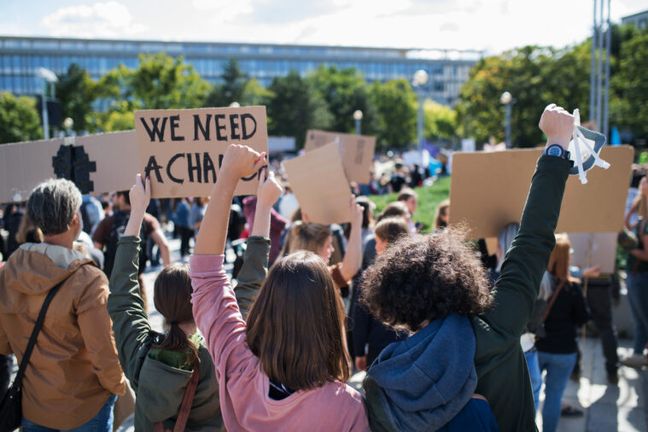So far in 2023, there has been a surge in strikes and labor actions across various industries in the United States, with employees demanding better wages, improved working conditions, and enhanced benefits. Due to this notable increase in labor disputes, it is essential for employers to understand the legal framework that protects employees engaged in protected activities such as striking and picketing. Federal law grants employees the right to participate in such actions without facing retaliation from their employers.[i] However, the National Labor Relations Board (NLRB) in General Motors handed down a significant decision that has threatened this long-standing protection.[ii]
I. Case Background
In General Motors, the NLRB announced a departure from specific setting-based standards to determine if employers had unlawfully disciplined or discharged employees involved in “abusive conduct” during protected activities like striking or picketing.[iii] Instead, the NLRB adopted the Wright Line burden-shifting framework, which places the burden on the employer to show the employee’s discharge was motivated by a legitimate business reason.[iv] This change raised concerns for some as it potentially made it easier for employers to accuse employees of abusive conduct during protected activities.
Before the General Motors decision, established federal labor law had relied on “setting-specific” standards, considering the severity of an employee’s misconduct and the context in which it occurred when addressing cases involving disciplinary actions or terminations during protected activities under the National Labor Relations Act.[v] Thus, the NLRB’s stance in General Motors diverged from long-established precedent.
In its original decision in Lion Elastomers, the Board applied the Atlantic Steel test to determine whether the employer had violated the National Labor Relations Act.[vi] However, the United States Court of Appeals for the Fifth Circuit remanded the case to the NLRB for the NRLB to determine the effect of the Board’s intervening decision in General Motors on Lion Elastomers.[vii]
Then, on May 1, 2023, the NLRB overruled General Motors and reaffirmed its prior Board law, restoring the application of setting-specific standards in cases involving employees disciplined or discharged for misconduct during protected activities.[viii]
II. Discussion: Safeguarding Workers’ Rights
The General Motors case carries several important implications. First, it emphasizes the significance of balancing power dynamics during collective bargaining negotiations and strikes. The NLRB recognizes that strong language used by employees during picketing or strike activities is expected and protected under the law.[ix] By safeguarding this expression, employees can actively participate in negotiations and rely on their representatives without fear of retribution. Protecting their ability to engage in protected activity encourages a more balanced and fair labor market.
Second, the ability of employees to engage in protected activities without fear of retaliation plays a pivotal role in establishing and maintaining labor standards. Shielding workers from such retribution serves as a deterrent against unfair labor practices and fosters compliance with laws and regulations. Ultimately, this commitment to protecting workers’ rights contributes to a healthier and more just labor market, fostering an environment where workers’ rights are respected and upheld.
III. Conclusion: Upholding Workers’ Rights
The NLRB’s decision in General Motors underscored its commitment to ensuring that workers’ rights are protected under the National Labor Relations Act. By overruling General Motors, the Board has maintained a consistent approach that accounts for the severity of an employee’s misconduct and the context in which it occurred during protected activities. Lion Elastomers reaffirms the Board’s commitment to ensuring that workers’ rights are protected under the National Labor Relations Act. This reaffirmation of protection for employees engaging in strikes and picketing is vital for maintaining a fair and balanced labor market that respects the rights of workers across the United States. Employers must ensure any adverse employment actions taken due to employee misconduct during protected activities are supported by the longstanding setting-specific standards previously in place.
Keep Reading
Sources
[i] Right to Strike and Picket, https://www.nlrb.gov/about-nlrb/rights-we-protect/the-law/employees/right-to-strike-and-picket .
[ii] Gen. Motors LLC, 369 NLRB No. 127 (July 21, 2020).
[iii] Id.
[iv] Id.
[v] National Labor Relations Act, 29 U.S.C. §§ 151-169.
[vi] Lion Elastomers LLC & United Steel, Paper & Forestry, Rubber, Mfg., Energy, Allied Indus. & Serv. Workers Int’l Union, Loc. 228, 372 NLRB No. 83 (May 1, 2023).
[vii] Id.
[viii] Id.
[ix] Id.

 Editor: Ashley Paige Fetyko
Editor: Ashley Paige Fetyko
 Cannabis Workers Allege Quota to Trim 4 Pounds a Day Violates the California Labor Code
Cannabis Workers Allege Quota to Trim 4 Pounds a Day Violates the California Labor Code
 The Ninth Circuit Reminds Us: Every Word Matters
The Ninth Circuit Reminds Us: Every Word Matters
 NO WAY, PRO SE! The Consequences of Abusing the Judicial System as a Pro Se Litigant in Colorado
NO WAY, PRO SE! The Consequences of Abusing the Judicial System as a Pro Se Litigant in Colorado
 Victim of Financial Mismanagement or Unlawful Retaliation? New Jersey City University Program Founder Claims School Retaliated After Reporting Alleged Sexual Harassment
Victim of Financial Mismanagement or Unlawful Retaliation? New Jersey City University Program Founder Claims School Retaliated After Reporting Alleged Sexual Harassment
 “Real Housewives” Gets a Reality Check
“Real Housewives” Gets a Reality Check
 Missing a Chapter: Insufficiency of Expert Deposition Testimony in Medical Malpractice Litigation
Missing a Chapter: Insufficiency of Expert Deposition Testimony in Medical Malpractice Litigation
 Crash Course: Why Summary Judgment Misses the Mark in Illinois Multi-Cause Limousine Crash Collision
Crash Course: Why Summary Judgment Misses the Mark in Illinois Multi-Cause Limousine Crash Collision
 Bitter Truths: Lead, Cadmium, and Defective Pleadings in California Chocolate Class Action
Bitter Truths: Lead, Cadmium, and Defective Pleadings in California Chocolate Class Action
 The Law of Unintended Consequences: Including Insurance Brokers in Litigation Strategy Communication May Waive the Attorney-Client Privilege
The Law of Unintended Consequences: Including Insurance Brokers in Litigation Strategy Communication May Waive the Attorney-Client Privilege